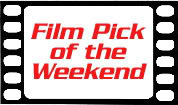 I'm writing this while taking a break from a particularly arduous experimentation with Apple's iMovie '08 program. Despite being billed as extremely user friendly for the casual home filmmaker, I'm having a lot of trouble getting it to do things that I think should be pretty basic. Basically, I can't make heads or tails of it, which is ironic because I was trained on much more sophisticated editing software during my time in film school at an extremely prestigious public university, known for its highly selective admission policy, the industriousness of its student body and its rigorous academic standards—though I won't be so gauche as to mention its name here*.
I'm writing this while taking a break from a particularly arduous experimentation with Apple's iMovie '08 program. Despite being billed as extremely user friendly for the casual home filmmaker, I'm having a lot of trouble getting it to do things that I think should be pretty basic. Basically, I can't make heads or tails of it, which is ironic because I was trained on much more sophisticated editing software during my time in film school at an extremely prestigious public university, known for its highly selective admission policy, the industriousness of its student body and its rigorous academic standards—though I won't be so gauche as to mention its name here*.
Despite my ineptness, a quick glance around the internet shows that plenty of smarter people are making their own films. As the technology to do so grows cheaper and (allegedly) easier to use, the art form becomes democratized, which can be a bit of a mixed blessing. For every budding basement Bertolucci, there are a million unashamed Ed Woods (minus the historically contextualized charm), and as the haystack grows ever larger, the needle gets harder to find…but hey, better too much than too little, I suppose. However, it would be nice if more people would put a little planning into their work before slapping it up on YouTube for the world to see.
This is where filmmaker Mike Figgis (Leaving Las Vegas, Internal Affairs, Timecode, et al) steps in. Figgis recently released a book, Digital Filmmaking, in which he offers a fascinating tutorial on the art of low-budget filmmaking. As the title implies, he is writing strictly for the digital video crowd, understanding that in this day and age, only the most ambitious and confident among us shoot their low budget movies on actual film. Figgis addresses nearly all basic aspects of low budget video production including equipment choice, technical tips, working with your actors, distribution and much more.
What sets Figgis' book apart from other similar manuals is his easy-to-digest conversational style, his frequent use of incidents throughout his own career as examples of what he is talking about and his excitement about the possibilities that the digital medium offers. The advent of any technology always generates some friction between the old guard set on keeping the status quo and those who would eagerly embrace the new. In the film industry (much the same as the music industry) there has been a debate for some time about the relative merits of the analog (film) versus the digital (video).
Working with actual film tends to be a much more difficult technical process, requiring an incredible amount of planning—before, during and after the shoot. It's prohibitively expensive, tremendously fickle and it can take countless hours to create the smallest piece of footage. Digital, on the other hand, is fast, cheap and forgiving. It needs less of pretty much everything than film does and the fact that it's so relatively inexpensive to use and that you can see what you've filmed immediately after you've filmed it means that you can shoot and shoot and shoot until you get it right, without having to worry about how much you're spending burning through your film.
Both media have their unique aesthetic qualities. Though the argument that film just plain looks better than digital is completely subjective (and frequently depends on how each format was shot), there is an undeniable visual difference between the two. What I admire about Figgis' book is his clear emphasis on the message over the medium. Regardless of with what media a story is created, the ultimate worth of the work lies in what it is about and how it's conveyed, not in the tools that were used to create it. Ideally, one would present their story with all the visual oomph it warrants (and the book definitely offers nuts-and-bolts tips to help you achieve this), but in the end, for Figgis, the story a film tells trumps the technical skill with which it is told. This is a refreshing breath of sanity in an industry that at times has seemed paralyzingly obsessed with whether or not the digital format is valid as a creative medium. You work with what you have and if you really have the drive to create and you have something worth telling, any noticeable technical limitations begin to decrease in importance. Great advice in this modern age of part-time teenage filmmakers and aspiring Hollywood-types alike. Buy this book and make your movie.
Digital Filmmaking by Mike Figgis; Faber and Faber. Paberback, 158 pages, $13.00.
*Though I will mention it down here. It was UC Santa Cruz, and yes, I graduated summa cum loaded, thank you very much.

